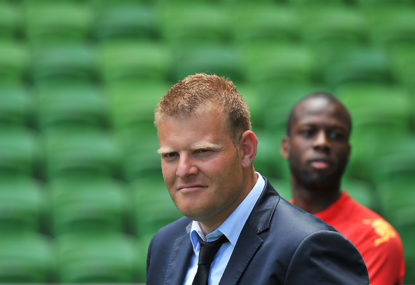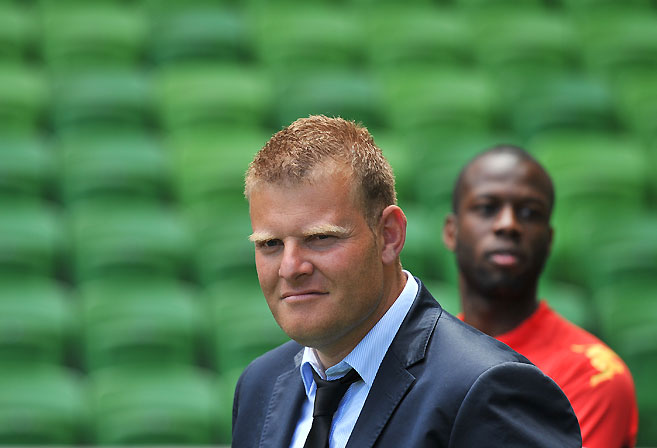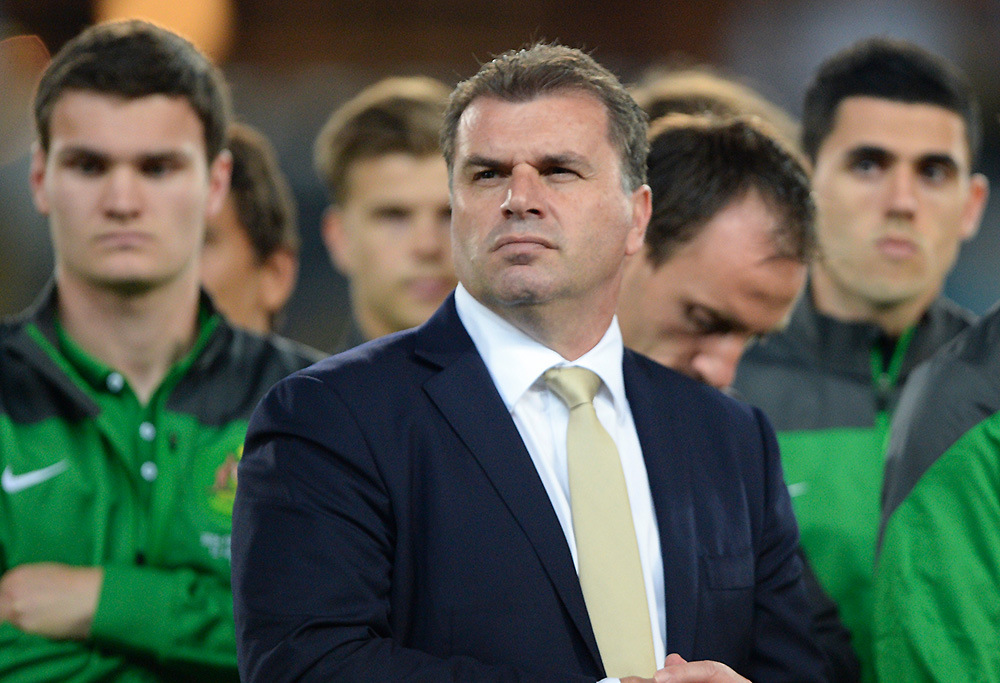Young excellence, promotion battles, and a happy farewell: The Australian team of the week from players around the globe
Even though St.Pauli ultimately lost a high-scoring affair, Jackson Irvine was a standout, as well as scoring a late goal.

During the Confederations Cup, we saw Josep Gombau, eyes narrowed and darting, prodigious jaw jutting out in thought, an unassuming, background member of Ange Postecoglou’s team.
Postecoglou is currently wading through a particularly treacly period of his national plan; the particular mould he is, slowly but surely, forcing over the unyielding hunk of raw Socceroo clay in front of him is a complex design, and as such is not fitting quickly or comfortably. And yet, through the three Cup matches against Germany, Cameroon and Chile, we saw the team’s lumps and clods reshape themselves a little, if not quite enough to earn more than two points over three games.
Progress was nonetheless visibly made, and the most immediate measure of it will come in two months’ time, against Japan in the World Cup qualifier at the end of August. But the longer-term view of the national set-up takes in vistas that glint and glimmer over a horizon much further-reaching than that, and Gombau, who had a sideline view of the state of the present, is also well-placed to appreciate – and rear – the flickers of the future.
Gombau announced his preliminary squad for the Under-23 AFC Championships earlier this week, a list of 26 players that will be cut down to 23 before the trip to play Myanmar on July 15.
This generation of players – almost half of whom were born in 1997 or later – represent the future of the national team, still in their malleable phases, with many of the most experienced members having barely spent one season in the A-League senior ranks.
Gombau said back in February that his U-23 team would be “playing system and style that is the same as the Socceroos.” Gombau was Barcelona’s youth team coach for six years, from 2003 to 2009, and the end of his time there crossed over with the beginnings of Pep Guardiola’s management career in Catalonia.
Of course, the team that Guardiola would end up constructing is now considered one of history’s greatest, but perhaps it’s the process, not the glittering proceeds, that one hopes made the best impression on Gombau. He will have seen, while he was at Barca, as well as after leaving, how important consistency of approach is for the success of a system.
The little Messi’s in the making know how Barcelona play, and what’s expected of them. Gombau’s job as Australian U-23s manager, just as it was in charge of the joyful, adroit sprites at La Masia, is to propagate the ideology.
Now, although there have been many legitimate questions raised over Ange’s system and the wisdom behind it, there can be no argument against the assertion that, if we are going to be playing a certain way at the senior national level, we must have unity of message. The current system may not succeed in the upcoming crunch qualifiers, let alone at the World Cup proper, but its long-term prognosis is surely fatal if the next generation spend their national duties learning to play in a totally different way.

(AAP Image/Julian Smith)
Australia cannot really hope to emulate a country like Spain, whose national ethos is, by and large, a slightly modified version of the approach championed and perfected by one of its biggest and most successful clubs, Barcelona. Barca is a club that the national team also, funnily enough, sources heavily from.
We have no flagship club that shelters vast swathes of our national team. To read the Socceroos squad sheet is to make a globetrotting journey, from Melbourne to Portugal, from Rotterdam to Yokohama. This is a group asunder, so cohesion at the national level cannot be expected to the degree the Spaniards enjoy.
Furthermore, the bare handful of occasions that the national team, in all its ranks, actually congregates every season is hardly enough to learn a complex system all that quickly, even with the odd international tournament thrown in.
Still, Riley McGree, Jonathan Aspropotamitis, Bruce Kamau and the rest of the U-23s will only benefit – from a Socceroos perspective – by being prepped, on-the-job, on what kind of things are expected at senior level.
Aspro, or Thomas Deng, might be groomed to fill Trent Sainsbury’s out-stepping, ball-playing centre-back role. Scott Galloway, who began his career in the midfield before moving into a full-back position, might be taught to negotiate the teetering duties of the wing-back.

(AAP Image/Lukas Coch)
McGree, the latest young starlet to – we hope, for his sake, not unwisely – leave the A-League after too short a debut, might be asked to mimic the subtle cerebral shifting and passing of Mark Milligan, so as to one day replace him like-for-like in the senior midfield. This is the purpose of the youth teams, is it not?
A conveyor belt does not deliver its contents to the end of the line as unformed, vague assets; no, the finished product, finally brought into the senior limelight, should be purpose fit to slot right in, even better than the part it’s replacing.
Ange’s persistence, his ideals, must bleed down the ranks, and might also – provided they are deemed worthy by a stern litmus test, say, a World Cup – linger after he has left the post. Systemic consistency at all national levels can only be good for the long-term prospects of our senior team. The sooner Gombau impresses on his shining charges what might become known as the ‘Socceroos Philosophy’, the better prepared they’ll be.